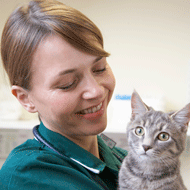Pet behaviour: what is the RVN's role?

Nurses should be able to provide advice on good behavioural husbandry.
"Every GP nurse requires a basic knowledge of companion animal behaviour, in order to meet client and patient needs," said RVN and clinical animal behaviourist, Stephanie Hedges, at BVNA Congress today.
However, informal research suggests this is not always included in veterinary nurse training, something Hedges has campaigned to change. Speaking to nurse delegates, she outlined the nurse's role in behaviour, answering the crucial question, 'to give or not to give behavioural advice?'
So what do nurses need to know? First, anatomy and physiology, which encompasses the animal's environmental, behavioural and emotional needs. What is the animal's normal behavioural? How to they communicate? Are they territorial? Do they enjoy the company of others?
Next, control and restraint. Understanding the patient's behaviour will allow you to handle the animal far more effectively, recognising that a growling animal with its ears back may in fact be showing aggression due to fear. It's important to learn methods of approach and low stress handling techniques.
The benefits of this are widespread, not only does it reduce the risk to staff, owners and the wider public, it improves animal welfare and could reduce the risk of future aggression - not just within the practice, but outside it as well. Hedges gave examples of patients she has seen who actually developed aggression problems after bad handling experiences at veterinary practices.
Furthermore, there is evidence to suggest that some clients will change practices if they are unhappy with the way their animal was handled by veterinary staff, or the level of advice their practice was able to give them on behaviour.
For newly admitted patients, Hedges continued, it is useful to take a behavioural summary from the client. This will allow the practice to provide the correct housing, exercise and stimulation, and to manage any fear, anxiety or stress to which the animal may be disposed.
It is also important for veterinary staff to provide the client with the correct information on handling - for example, deaf or blind animals, those in cognitive decline, or those who require cage rest. Again, Hedges highlighted cases she had seen where pets developed a raft of behavioural problems due to a lack of appropriate mental stimulation during cage rest.
Nurses should be able to provide advice on good behavioural husbandry, prevention of problem behaviours, and basic first aid to keep families safe and prevent deterioration whilst behavioural interventions are underway. Knowing the effects of neutering, diet and medications on behaviour should also be understood.
Working with qualified behaviourists and knowing when and where to refer is key. It's worth noting that veterinary staff are required to refer cases responsibly, to protect the owner and animal from incorrect assessment, diagnosis, handling and advice.
In addition to acquiring basic behaviour knowledge through CPD etc, some nurses may choose to progress their careers by becoming, for example, clinical animal behaviourists. Hedges believes that nurses are in a fantastic position for this type of training, as they are also able to spot physical health problems that could be causing the behavioural issues. And it is essential to always rule out illness as a cause of problem behaviour.
Certain behavioural issues in companion animals can have serious implications for an owner's quality of life, public safety and, perhaps most of all, for the animals themselves. Research has shown that behaviour is the number one reason for euthanasia in dogs under three years of age.
In veterinary practice, it also impacts on staff safety, stress and morale. But with even a basic knowledge of animal behaviour, nurses can make a significant difference across all of these areas, whilst helping to retain clients by providing them with the information they seek, and handling their animals in a way that reassures them.



 The latest
The latest